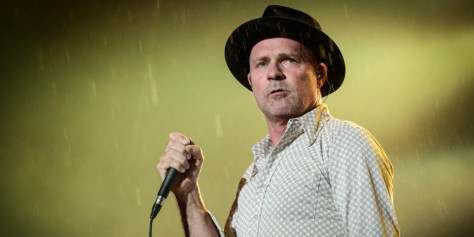His place in the firmament of Canadian music is well established
✎ Wayne K. Spear | October 19, 2017 ◈ Obituary
I’VE NEVER BEEN A Tragically Hip fanatic, and that’s a shame, because the two shows that I saw were the kind of show a fanatic would give an arm to have attended.
 Gord Downie established himself as a symbol of Canada
Gord Downie established himself as a symbol of Canada
The first performance was in a St Catharines bar called The Hideaway, before The Hip were well-known, in the mid-1980s. We were so close to the stage that the sweat from Rob Baker’s hair was raining down on me and my friends, so we retreated into the crowd. The next and last time I saw The Hip was in 1994, in a small Kingston pub, where the band suddenly turned up for an unannounced free show. At the time I was hanging around with the curator of a local art gallery whose painter boyfriend was a close friend of the fellow who painted the cover of Day for Night. I got a call telling me to get to the pub, now, which I did, only minutes before it filled to beyond capacity.
The Tragically Hip made the most sense to me in bars, the seedier the better. I remember stepping into a Sudbury dive as the chorus to Little Bones played on the radio. I sat in the corner with my watery beer, and the song felt like the soundtrack of the place. In Sault Ste Marie, New Orleans Is Sinking. In Prince Albert, Courage. In Moncton, Ahead by a Century. Then there was Bobcaygeon, a song in a category of its own because some of my earliest memories are of the cottage my family had there, in the 1960s and 70s. We love musicians because they make music, and we love music because it captures and preserves our fondest memories like an amber that you can dance and sing along to.
Every obituary is about its author as well as its subject. We write of others to affirm our values and to praise what we hope to have within ourselves. A life lived is an object lesson, a set of actions and commitments to be appraised, celebrated, or (in some cases) denounced. And one day my friend you will arrive at the place, if you haven’t already, where the obituaries make you think, “my goodness, I’ll be that old very soon” or “she was younger than I” or (as I thought of Gord Downie) “he was the same age as me.” A selfish thought, but also human.
I am tempted to reach for the cliché that Gord Downie died before his time, but of course the time when one leaves this world is by definition his time. He died young, doubtless before he had said everything he wanted to say and before he had made everything he wanted to make. But he was also old enough to have left an indelible and enviable mark upon Canadian music and culture. The depth of his influence was revealed last May when news of a tumour went out to a stunned public. The tour that followed ranks among the most widely viewed and widely discussed in Canadian music history, as the outpouring of sentiment, then and now, attests. Gord Downie managed to do what only a handful of Canadian musicians have done—establish himself as a symbol of Canada. In this, he has joined the company of Gordon Lightfoot and Stomping Tom and Joni Mitchell and Leonard Cohen, all of whom, please note, are a full generation older.
Gord Downie committed himself late in life to causes including environmentalism and raising awareness of the Indian Residential School System. At the end, knowing his time was short, there came a final blast of creative fury. He took up the story of Chanie Wenjack, creating a book and album and film about the real-life boy who died trying to escape the Cecilia Jeffrey Indian Residential School. He set up the Gord Downie & Chanie Wenjack Fund. He became a prominent vocal proponent of Indigenous people, in a time when there were already numerous books, by Indigenous people, on numerous topics including residential schools.
An October 21, 2016 Walrus article asks, “Why is Gord Downie getting more attention for retelling Indigenous history than Indigenous artists?” The short answer is that Downie, because he was a rock star, could reach an audience few if any Indigenous authors could. That’s an unpleasant truth for those of us who are the Indigenous authors of books about the Indian residential schools, but it’s a truth nonetheless. I remember the day Secret Path arrived to fill the windows of a local bookstore where my book, Residential Schools, wasn’t even stocked. Again, the selfish but also human thoughts. I was glad the Wenjack story would get out, but I wished it didn’t take a pop-culture celebrity to do it. Are we going to have to assign a rock icon to each of the thousands of Chanie Wenjacks?
It’s too soon to say what Downie’s influence and legacy will be as these pertain to his twilight interest in Chanie Wenjack and Indigenous people generally. But his place in the firmament of Canadian music is well established. Gord Downie’s music will live on, and so will the Gord Downie & Chanie Wenjack Fund. May good come of it.


